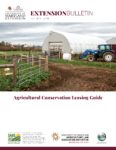Showing 1-2 of 2 results
How Alive is My Soil?
This guide presents soil testing methods that can be performed in the field by farmers, gardeners, or anyone who desires to understand and appreciate soil from a different perspective. While these tests aren’t intended to be a replacement for sending soil to a lab, they can be considered complementary to annual or biannual lab analysis.

Agricultural Conservation Leasing Guide
This bulletin, authored by Sarah Everhart of the University of Maryland Francis K. Carey School of Law, provides guidance to farmers, landowners and agricultural service providers interested in lease agreements to help implement stewardship planning and conservation practices on leased land. The publication describes many popular conservation programs and considerations for how they might be […]